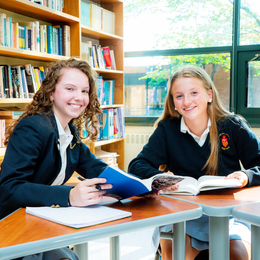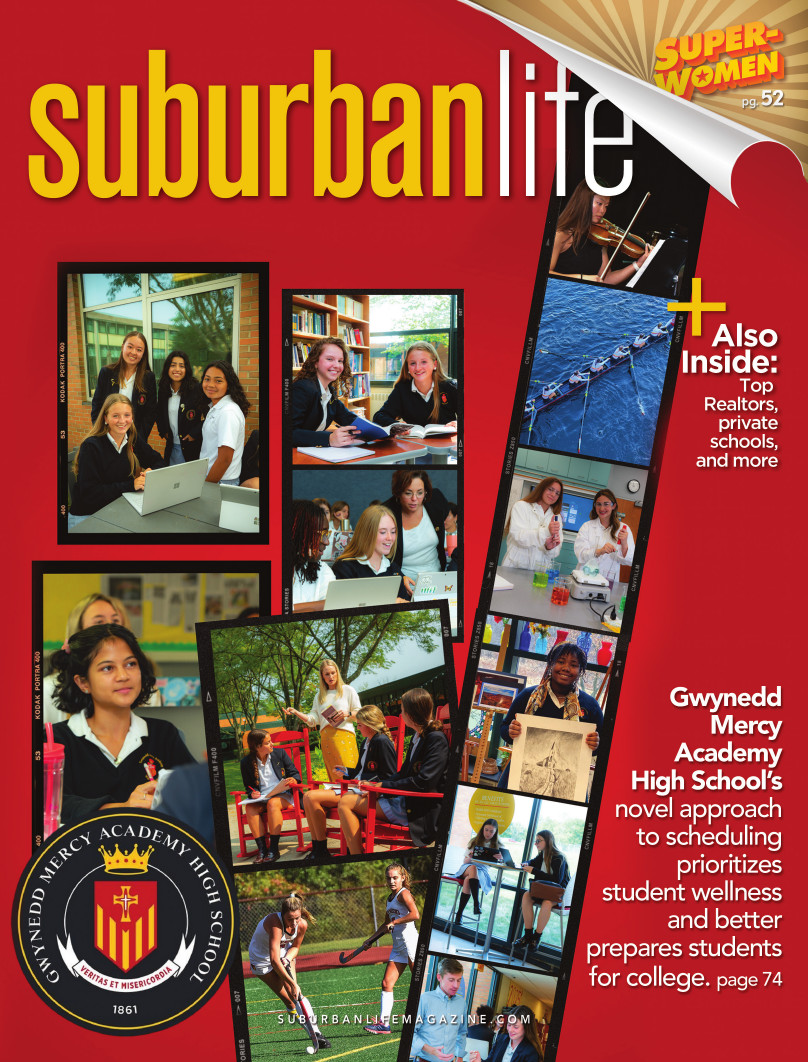
A Breath of Fresh Air
Gwynedd Mercy Academy High School’s novel approach to scheduling prioritizes student wellness and better prepares students for the challenges ahead.
High school students often say they struggle to fulfill the many demands on their time—academic study, athletics, extracurriculars, college essays, applications, and more—all while trying to maintain a busy social life.
This year, students at Gwynedd Mercy Academy High School are finding it a bit easier to strike that delicate, important balance. As one of its efforts to prioritize student wellness and better prepare students for the rigors of college, Gwynedd has adopted a forward-thinking approach to its daily timeline. The new schedule is the product of a strategic plan that began four years ago, which allows students to maximize their time and plan more efficiently, thereby reducing stress.
“Previously, students had eight classes daily for 40 minutes,” says Eileen Carty, the new principal of the all-girls’ Catholic high school in Gwynedd Valley. “Despite challenges posed by the pandemic, we remained focused on our goal of developing this new schedule for the benefit of our students and faculty. Now, our girls not only have more time to devote to academics but also to meet with counselors and teachers and complete homework assignments.”
The new rotating schedule was a big change, according to Carty, but in collaboration with the Delaware-based organization Independent School Management, the transition was a smooth one with “Monarchs in Motion.”
A departure from traditional and block formats, Gwynedd’s research-based approach to the daily schedule utilizes 60-minute subject periods on a rotating timetable. This ensures that classes are attended at different times of day to enhance attention and learning, while allowing for additional collaboration and activities beyond the classroom. Carty says it also allows more freedom throughout the day to complete independent work and assignments.
“With this structure,” she adds, “students have added time for co-curricular activities, social development, and emotional engagement.”
Additionally, student athletes and students with end-of-day commitments do not miss the same class every time there is a game or a meet. As 100 percent of Gwynedd’s graduating students go on to pursue studies at a college or university, the extra time in the day to speak with college counselors is invaluable. With increased ability to plan ahead, students can make appointments during study halls.
Kim Scott, Gwynedd’s director of enrollment management, has been impressed by how well the new schedule is working for students.
“Now, students can dive deep into various subject matters, seek extra help or tutor a peer, and participate in an activity, all during a regular school day,” she says. “Students with afterschool obligations—whether they work, play a sport, or catch a bus, now have added time allocated within school hours. Every class is now an hour long, and students have time built into their school day that doesn’t take time away from their education but allows them to participate in clubs, leadership opportunities, other activities, and networking with our own alumnae through different programs we offer.”
This all ties into Gwynedd’s larger commitment: to foster student wellness in mind, body, and spirit. Scott also emphasizes the importance of socialization, not just among same-grade peers but also among the faculty and students from different grades. The Gwynedd Wellness Program supports the school’s commitment to educating, inspiring, and empowering young women “to be merciful in spirit, innovative in thought, and courageous in leadership.”
The program combines the efforts of departments including school counseling, college counseling, ministry and service, leadership, DEIJ (diversity, equity, inclusion, and justice), alumnae engagement, and health and physical education. Whereas some school wellness initiatives incorporate only a few facets, Gwynedd’s “Wellness Wheel” features eight domains of wellness: financial, intellectual, occupational, social, physical, environmental, spiritual, and emotional.
“The eight domains help us support the girls,” Carty says. “Through collaboration among multiple departments, we provide programming that is grade-level specific. The scheduling that we have created provides the ability to dedicate time throughout the day to expand programming in these eight domains that help support the girls holistically.”
Carty notes that in general when people talk about wellness, the largest focus is on mental health, anxiety, and stress. While addressing each of these factors is essential, Carty says the scope of student wellness includes far more.
“One of the things I continue to emphasize is the balance of overall wellness,” she says. “Wellness is a topic which goes beyond emotional and mental health; it also extends to topics including financial literacy and intellectual intelligence, physical activity, and social interaction. When alumnae come to speak about professions and civic engagement, they contribute to overall wellness. We look at the big picture of who someone is, as a student and as a person, who is going to go on from here. We make sure that all eight parts of the Wellness Wheel are addressed during each of their four years to better prepare them for life after high school.”
Scott notes that meeting alumnae mentors benefits students in myriad ways, from networking to learning business etiquette such as email signatures, greetings and handshakes, exploring potential externships, and more.
As for the new schedule, Carty says feedback from parents, students, and faculty has been resoundingly positive.
“Students say although their workloads have remained the same, they are better able to manage their time,” she says. “Students as well as parents are glad that students aren’t going home with excessive amounts of homework at night, allowing them to focus on and participate in other areas of their lives. Our faculty are pleased that the new format enables them to cover more material with their classes, have planned time to support students on an individual basis, and leverage the ability to regularly collaborate with colleagues. When students and faculty alike feel more balanced and productive, it’s a win-win for everyone.”
Gwynedd Mercy Academy High School
1345 Sumneytown Pike
Gwynedd Valley, PA 19437
(215) 646-8815
gmahs.org
1345 Sumneytown Pike
Gwynedd Valley, PA 19437
(215) 646-8815
gmahs.org
Photo by Jody Robinson
Published (and copyrighted) in Suburban Life, September 2022.



